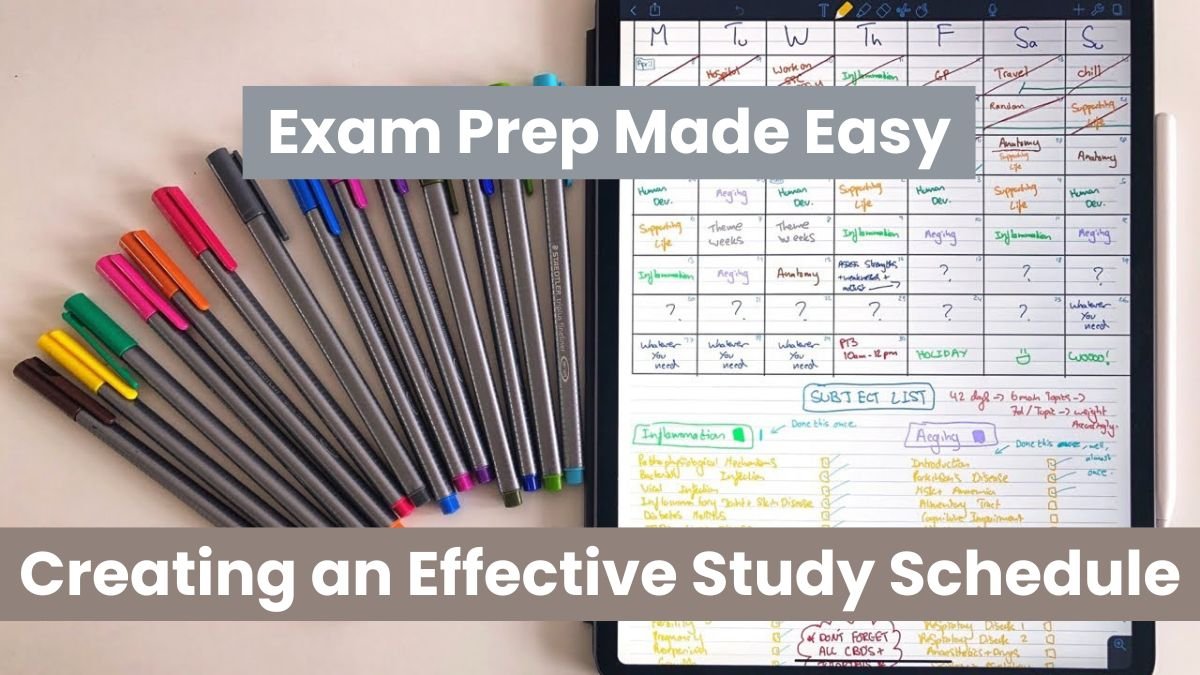As the exam time approaches, the anxiety of students and their parents starts increasing. On one hand there is the tension of getting good marks, on the other hand it is also important to keep mental health good. In such a situation, if a good study plan i.e. study schedule is made, then all the preparations can be done very easily and with comfort.
In this article, we will tell you how you can create a study schedule for yourself or your child that not only improves exam preparation, but also maintains the balance of the rest of life.
First of all, assess the time and set goals
When the exam starts approaching, the first thing to do is to understand how much time is left for preparation. Now if you are a parent, help your children to create a realistic and sensible time table.
How to do it?
1. Divide and Conquer:
First of all, see how many days or weeks you have left. Then divide the time for each subject, keeping in mind the difficulty and importance of that subject.
Example:
If the child is weak in Maths and good in Science, then Maths should be given more time.
2. Set small goals:
There should be a very small and easily achievable task laid out for a study session, such as, “I will totally understand chapter 5 of History today,” or, “I will work through 10 Maths problems today.”
These small goals keep students motivated in their studies and distracted less.
Prioritize subjects and topics
It is every student that has his or her strengths and weaknesses. Hence, it is first wise for a student to know which subjects or topics he or she finds difficult and needs to spend extra hours working on.
For this, boards like CBSE have fixed the syllabus that makes it very easy for students to find out the important topics.
How to do it?
- Look at previous years’ papers: This will help you understand which topic has more questions.
- Plan your revision: Revise the topics you know well, bit by bit. But spend more time on the difficult ones.
Divide your day wisely
A study plan works well only when the day is divided properly. You or your child should use every hour properly – strike a balance between study, breaks and rest.
Example schedule:
- Morning: When the mind is fresh, study difficult subjects like Maths and Science.
- Afternoon: When the time is a little less, study subjects related to Arts, Social Science or Language.
- Evening: Revise what you studied during the day and solve mock tests or practice papers.
Parents can help children follow this timetable.
Adopt the Pomodoro Technique
This is a very effective way to stay focused in studies.
This technique says:
- Read continuously for 25 minutes.
- Then take a short break of 5 minutes.
- After 4 such sessions, take a long break of 20-30 minutes.
This prevents fatigue and the brain also remembers the information in a better way.
Make time for practice
Understanding the studies is important, but practicing repeatedly is even more important.
How to do it?
- Take mock tests, solve sample papers and old years’ question papers.
- Create an exam-like environment – set a timer and solve the entire paper within the same time limit.
- Analyze the mistakes – find out where you are going wrong and correct it.
This increases confidence and reduces nervousness during the exam.
Use visual tools and study apps
Most of us are able to understand quickly through pictures, charts and diagrams. In such a situation, studying becomes even more fun and easy with these tools.
Useful tools:
- Mind maps: A quick summary of an entire chapter on one page.
- Flashcards: A great way to remember formulas, definitions or dates.
- Educational apps: There are many apps available as per CBSE syllabus that make studying easy and interactive.
Don’t forget rest and exercise
Mental fatigue is common while studying. Therefore, it is important that children take mental and physical rest in between.
What can you do?
- Meditation: Just 10 minutes of meditation increases focus.
- Yoga or walk: Light exercise refreshes both the body and the mind.
Parents can make it a habit for children to take a 10-15 minute break after every 2-3 hours of study.
Check and change the plan from time to time
Your schedule will not be perfect. As your studies progress, your needs will change – so should your schedule.
- Is a subject demanding more time? Allocate less time to it from other subjects.
- Track your weekly progress and see if your goals are being met.
Avoid distractions
A proper study environment is essential and should comprise a calm, clean and organized atmosphere in which the child can study in peace.
Things to attend to:
- The environment should be clean and with good lighting. All necessary things should be organized beforehand, such as books and notebooks and so on.
- Keep phones and gadgets far away unless using them is necessary for studying.
Stay positive and motivated
Don’t consider the exam as a fear, but as an opportunity to showcase your hard work and understanding. This thinking will make your preparation effective.
How to increase motivation?
- After completing each small goal, give yourself or your child a reward — like a favorite dish or a small break.
- Parents can boost their children’s confidence by saying positive things to them.
Conclusion
A good education is not just about It is not by being immersed in worries, but by having a balanced routine, good planning and the right mindset. It is not necessary that you study all day long, what is important is that you understand well and revise what you read.
So if you want to reduce exam anxiety a bit and strengthen your preparation, then follow the above tips and make a study schedule that works for you – not exhausts you.









